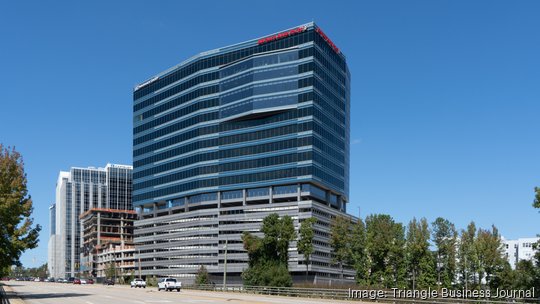
A Raleigh company with Bandwidth roots has closed on $13 million in new capital – an infusion that means jobs in the Triangle, even as other tech firms tighten their operations.
Raleigh-based Relay announced early Wednesday that it had closed on $13 million in financing from investors, including Sovereign’s Capital, Wind River Ventures and existing shareholders.
The fundraise should get the company, which moved into the Advance Auto Parts tower in Raleigh’s North Hills last year, to profitability, said CEO Chris Chuang in an interview.
“Hopefully this is the last round that we ever have to raise,” he said. “It should give us plenty of runway to reach profitability and at that point any additional fundraise would be to accelerate initiatives, but not because we need runway… this is the round that gets us to full profitability.”
The company, now at 135 employees, hired 35 people in just the past 18 months – and Chuang sees the headcount expansion continuing, particularly in sales and customer success as it builds out its enterprise sales operation.
Relay grew 130 percent last year, he said, “despite the challenging economy around us.”
“Our solution is more critical during tough times like these because when you have fewer people, you need to communicate better, coordinate to work more efficiently,” he said.
Relay has developed a cloud platform intended to help frontline teams better communicate and track performance using devices that are like smartphones – but without all the distracting apps. The company was initially part of Republic Wireless, a low-cost mobile phone service that spun out of Raleigh-based Bandwidth (Nasdaq; BAND) in 2016. The Republic Wireless brand was acquired by Dish Network in 2020. Chuang and several of his colleagues stuck around, turning an innovation that Republic Wireless had been innovating, into Relay – a standalone company that had initially targeted families with a single-button smart walkie talkie. But the firm took a major pivot due to inbound demand from business – and it hasn’t looked back.
With the capital infusion, it’s clear that investors, too, are all in on the vision.

How Relay raised $13 million
Chuang admits the market for fundraising is daunting. Relay first began to explore its options last summer, just as the VC cliff started to fall off. Chuang started by reaching out to his network of former colleagues, “testing the market.”
Nearly two decades ago, Chuang had been an associate at Technology Crossover Ventures, co-leading its coverage of telecom (and its investment in Motricity, which he later joined as a vice president of strategic development before moving onto Bandwidth, where he would grow to become Chief Operating Officer).
So he knew how to pitch. But he did meet with some “friction” from investors. Instead of just looking at the numbers, they wanted to see more proof of the business plan. It’s a different environment than just two years ago, when VCs were closing deals quickly.
“Now fundraises are, hey, even if I like your vision and your plan, I want to see you execute it for a few quarters or longer,” Chuang said. “The cycle is taking longer and we had to ride through that.”
Chuang said the team stayed in touch with potential investors over the quarters and just kept executing.
“We were able to turn some of those early conversations into an actual closing,” he said.
One of those first conversations had been with Sovereign’s Capital, which ended up as one of the main investors in the round. Sovereign’s, a faith-based investor, was co-founded by Henry Kaestner, who co-founded Bandwidth alongside David Morken. But it wasn’t just the shared history that had it investing, Chuang said. VCs are looking for more than the transaction – they’re looking for the relationship.
He advises other fundraising entrepreneurs to do the usual things: watch their cash flow and try to hit the numbers. But also build the relationship.
“Now it’s a buyer’s market, and you have to nurture that relationship more," Chuang said, advising entrepreneurs to pick their top five or 10 relationships and “communicate regularly… sort of building that relationship over time.”
“Hopefully that matures into a deal when they’ve seen enough evidence,” he added.

When Republic spun out of Bandwidth, Bandwidth’s original shareholders became stakeholders of Republic. And they remain shareholders of Relay. The latest investment is a minority stake. Chuang said the ownership and governance remains the same – and he, too, continues to maintain a stake in the company.
With the raise, Chuang said the plan is to just keep executing. He points to another fast-growing firm, Raleigh-based Pendo, which disclosed in 2021 that it had reached $100 million in annual recurring revenue, as inspiration.
“We admire them and are targeting to reach a similar plateau… the trajectory looks very good,” he said. “We’re pointed in that direction.”
And Relay continues to explore new markets. In addition to hospitality, it recently expanded into health care, signing a strategic partnership with Compass One Healthcare. And it’s having traction in areas such as manufacturing and distribution, as well as large venues.
In a prepared statement, Jake Thomsen, managing partner at Sovereign’s Capital, said the demand it’s seeing is part of the reason it invested.
“In this economy, frontline businesses have to get more done with fewer people,” Thomsen stated. “Achieving that requires more efficient communication and better coordination of teams and resources. Relay delivers both and we’re excited to partner with them on this important mission.”